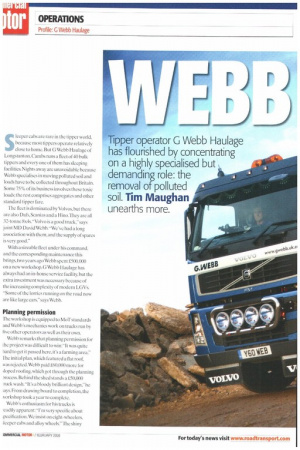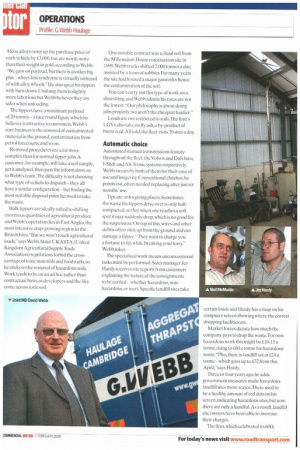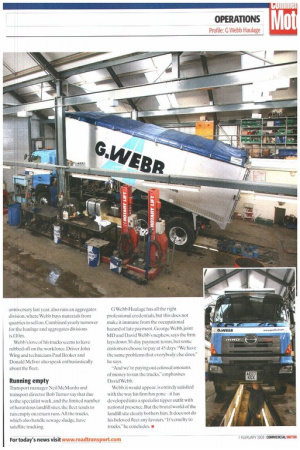Tipper operator G Webb Haulage has flourished by concentrating on a highly specialised but demanding role: the removal of polluted
Page 46

Page 48

Page 49

If you've noticed an error in this article please click here to report it so we can fix it.
soil. Tim Maughan
unearths more.
Sleeper cabs are rare in the tipper world, because most tippers operate relatively close to home. But G Webb Haulage of Longstanton. Cambs runs a fleet of 40 bulk tippers and every one of them has sleeping facilities. Nights away are unavoidable because Webb specialises in moving polluted soil and loads have to be collected throughout Britain. Some 75% of its business involves these toxic loads; the rest comprises aggregates and other standard tipper fare.
The fleet is dominated by Volvos,but there are also Dafs,Scanias and a Hino.They are all 32-tonne 8x4s."Volvo is a good truck," says joint MD David Webb."We've had a long association with them, and the supply of spares is very good."
With a sizeable fleet under his command, and the corresponding maintenance this brings, two years ago Webb spent £500.000 on a new workshop. G Webb Haulage has always had an in-house service facility, but the extra investment was necessary because of the increasing complexity of modern LGVs. "Some of the lorries running on the road now are like large cars." says Webb.
Planning permission
The worl, shop is equipped to MoT standards and Webb's mechanics work on trucks run by five other operators as well as their own.
Webb remarks that planning permission for the project was difficult to win:"It was quite hard to get it passed here, it's a farming area." The initial plan,which featured a flat roof, was rejected. Webb paid £60,000 more for doped rooting, which got through the planning )rocess. Behind the shed stands a 150,000 :ruck wash. "It's a bloody brilliant design," he ;ays. From drawing board to completion,the workshop took a year to complete.
Webb's enthusiasm for his trucks is eadily apparent:"I'm very specific about ;pecification.We insist on eight-wheelers, deeper cabs and alloy wheels." The shiny Alcoa alloys ramp up the purchase price of each vehicle by £3,000, but are worth more than their weight in gold. according to Webb: "We gain on payload, but there is another big pluswheel-loss syndrome is virtually unheard of with alloy wheels." He also specs his tippers with barn doors. Undoing them is slightly more laborious but Webb believes they are safer when unloading.
The tippers have a maximum payload of 20 tonnes-a nice round figure which he believes is attractive to customers.Webb's core business is the removal of contaminated material in the ground,contamination from petrol forecourts, and so on.
Removal procedures are a lot more complex than for normal tipperjobs.A customer, for example, will take a soil sample, get it analysed, then pass the information on to Webb's team .The difficulty is not choosing what type of vehicle to dispatch -they all have a similar configurationbut finding the most suitable disposal point licensed to take the waste.
Bulk tippers are ideally suited to shifting enormous quantities of agricultural produce and We bb's operation lies in East Anglia, the most intensive crop-growing region in the British Isles. "But we won't touch agricultural loads," says Webb. Strict UKASTA (United Kingdom Agricultural Supply Trade Association) regulations forbid the crosscarriage of toxic materials and foodstuffs, so he sticks to the removal of hazardous soils. Work tends to be on an ad hoc rather than contractual basis, as developers and the like come across toxic soil. One notable contract was to haul soil from the Millennium Dome construction site in 1999. Webb trucks shifted 2,000 tonnes a day, assisted by a team of subbies. For many years the site had housed a major gasworks, hence the contamination of the soil.
You can't carry out this type of work on a shoestring, and Webb admits his rates are not the lowest. "Our philosophy is about doing jobs properly: we aren't the cheapest haulier."
Loads are not restricted to soils.The firm's LGVs also take on fly ash,a by-product of burnt coal. All told, the fleet visits 30 sites a day.
Automatic choice
Automated manual transmissions feature throughout the fleet: the Volvos and Dais have I-Shift and AS-Ironic systems respectively. Webb swears by both of them for their ease of use and longevity.Conventional clutches, he points out,often needed replacing after just six months' use.
Tips are unforgiving places. Sometimes the waste the tippers drive over is only halfcompacted, Sc) that when one reaches a soft spot it may suddenly drop, which is no good for the suspension. On top of this,wires and other debris often stick up from the ground and can damage a tipper. "They want to charge you a fortune to tip, while breaking your lorry," Webb jokes.
The specialised work means unconventional tasks must be performed. Sales manager Jez Hardy receives site reports from customers explaining the nature of the consignments to be carried whether hazardous, nonhazardous, or inert. Specific landfill sites take certain loads and Hardy has a map on his computer screen showing where the correct dropping facilities are.
Market forces dictate how much the company pays to drop the waste. For nonhazardous work this might be £10-15 a ton ne, rising to £60 a tonne for hazardous waste. "Plus, there is landfill tax at £24 a tonne which goes up to £32 from this April," says Hardy.
Three or four years ago. he adds, government measures made hazardous landfill sites more scarce.lhere used to be a healthy amount of red dots on his screen, indicating hazardous sites, but now there are only a handful. As a result,landfill site owners have been able to increase their charges.
The firm, which celebrated its 60th anniversary last year, also runs an aggregates division, where Webb buys materials from quarries to sell on. Combined yearly turnover for the haulage and aggregates divisions is .C10m.
Webb's love of his trucks seems to have rubbed off on the workforce. Driver John Wing and technicians Paul Broker and Donald McIver also speak enthusiastically about the fleet.
Running empty Transport manager Neil McMurdo and transport director Bob Turner say that due to the specialist work, and the limited number of hazardous landfill sites, the fleet tends to run empty on return runs. All the trucks, which also handle sewage sludge, have satellite tracking. G Webb Haulage has all the right professional credentials, but this does not make it immune from the occupational hazard of late payment. George Webb, joint MD and David Webb's nephew. says the firm lays down 30-day payment terms, but some customers choose to pay at 45 days."We have the same problems that everybody else does," he says.
And we're paying out colossal amounts of money to run the trucks," emphasises David Webb.
Webb, it would appear, is entirely satisfied with the way his firm has gone — it has developed into a specialist tipper outfit with national presence. But the brutal world of the landfill site clearly bothers him. It does not do his beloved fleet any favours"It's cruelty to trucks," he concludes. o








































































































































































